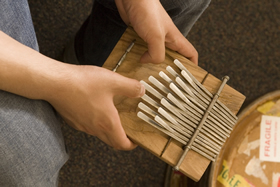Interlocking Melodies
Cosmas Magaya and Paul Berliner bring the mbira to Duke

When you encounter a mbira for the first time, you might underestimate it as a modest musical instrument. Sometimes called a "thumb piano," it's the traditional instrument of the Shona tribe of Zimbabwe. Compact enough to fit comfortably in both hands, the mbira consists of a wooden soundboard with 22 metal keys and a metal plate with buzzers, traditionally made of snail shells that vibrate.
"The mbira is a melodic instrument," says Cosmas Magaya, artist-in-residence at Duke and a master of the mbira. "In Zimbabwe, we say the shells ‘dress up' the instrument and give it a percussive quality."
The community will have the opportunity to enjoy the unusual sounds of this ancient instrument when Magaya and Paul Berliner, the Arts & Sciences Professor of Music, perform as special guests at the Duke Djembe Ensemble concert on March 21.
Magaya and Berliner have played together since the 1970s, when Berliner traveled to Zimbabwe to study what he calls "one of Africa's unique contributions to the world of music."
The mbira is somewhat perplexing. While it creates beautiful sounds that are immediately accessible and enjoyable, there's a mind-boggling complexity underpinning the strands of melody that seem so effortlessly woven together.
"Mbira music is a bit like jazz," Berliner adds, "in that it's an oral, improvisational-based tradition. Mbira players never perform the same song the same way twice."
Mbira music is also inherently collaborative. Each song consists of at least two parts with multiple melodic lines that interlock. Two performers are usually needed, though Magaya says there are virtuoso players who can simulate the effects of the combined parts on one instrument. He has performed in ensembles of eight musicians, each playing separate polyphonic parts.
Audience members will also have the opportunity to hear Magaya sing while he plays the mbira. Like the melody, the song's poetry is improvised, but based on tradition. The subject matter is often religious or historical, reflecting the sacred role of the mbira in Shona culture. At the concert, Berliner and Magaya will discuss the composition of the music and its significance in Shona life as an indispensable element for religious worship, memorializing and summoning ancestral spirits.
"One of my graduate students, an experienced composer, once said that he couldn't find words to describe the precise qualities of the sound that an mbira produces," says Berliner. "It is best appreciated, I think, in live performance."
Magaya agrees. Smiling, he says: "It is best for people to listen. Then they can assess the music for themselves."
A performance by the Duke Djembe Ensemble will feature Cosmas Magaya and Paul Berliner playing the mbira, directed by Bradley Simmons. The performance is at 8 p.m. on Friday, March 21, in Baldwin Auditorium. Tickets are free. For more information go to www.music.duke.edu or call 660-3333.